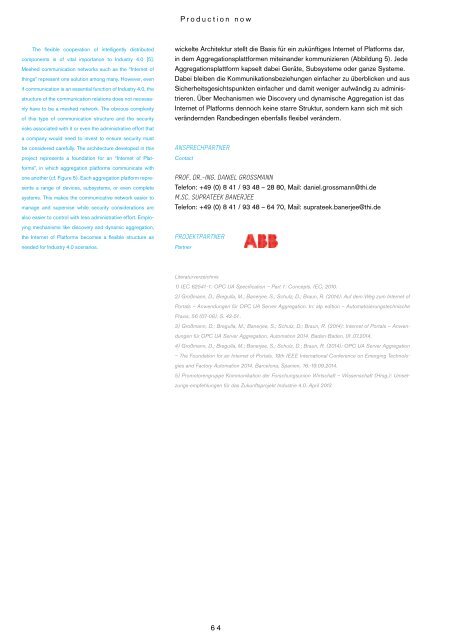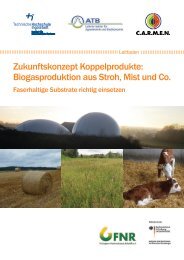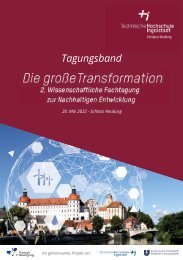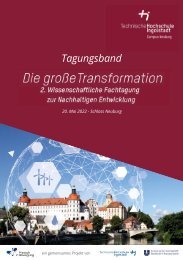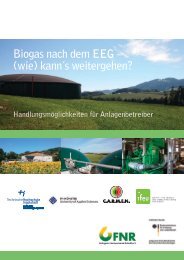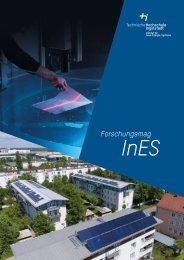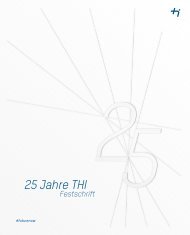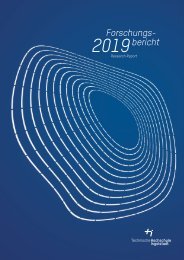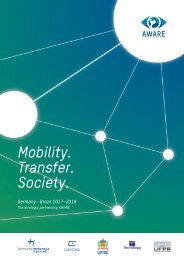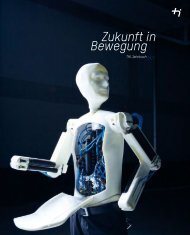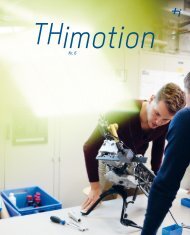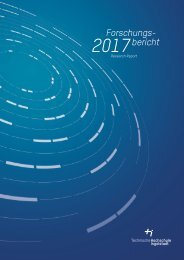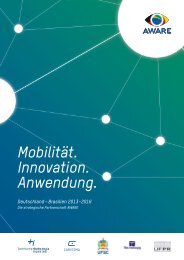Forschungsbericht 2015
Forschungsbericht 2015 der Technischen Hochschule Ingolstadt (THI)
Forschungsbericht 2015 der Technischen Hochschule Ingolstadt (THI)
Erfolgreiche ePaper selbst erstellen
Machen Sie aus Ihren PDF Publikationen ein blätterbares Flipbook mit unserer einzigartigen Google optimierten e-Paper Software.
Production now<br />
Production now<br />
The flexible cooperation of intelligently distributed<br />
components is of vital importance to Industry 4.0 [5].<br />
Meshed communication networks such as the “Internet of<br />
things” represent one solution among many. However, even<br />
if communication is an essential function of Industry 4.0, the<br />
structure of the communication relations does not necessarily<br />
have to be a meshed network. The obvious complexity<br />
of this type of communication structure and the security<br />
risks associated with it or even the administrative effort that<br />
wickelte Architektur stellt die Basis für ein zukünftiges Internet of Platforms dar,<br />
in dem Aggregationsplattformen miteinander kommunizieren (Abbildung 5). Jede<br />
Aggregationsplattform kapselt dabei Geräte, Subsysteme oder ganze Systeme.<br />
Dabei bleiben die Kommunikationsbeziehungen einfacher zu überblicken und aus<br />
Sicherheitsgesichtspunkten einfacher und damit weniger aufwändig zu administrieren.<br />
Über Mechanismen wie Discovery und dynamische Aggregation ist das<br />
Internet of Platforms dennoch keine starre Struktur, sondern kann sich mit sich<br />
verändernden Randbedingen ebenfalls flexibel verändern.<br />
AutoUniMo<br />
Im Rahmen des europäischen Forschungsvorhabens „Automotive Production<br />
Engineering Unified Perspective based on Data Mining Methods and Virtual<br />
Factory Model“ (AutoUniMo) wird eine enge Vernetzung von Wissenschaft und<br />
Industrie angestrebt. Dazu wechseln die Mitarbeiter des internationalen Konsortiums,<br />
bestehend aus Wissenschaftlern der Schlesischen Technischen Universität<br />
(SUT) und der THI sowie Industriemitarbeitern von aiut GmbH und Continental<br />
AG, zu den jeweiligen Projektpartnern (vgl. Abbildung 5).<br />
AutoUniMo<br />
Within the European research project “Automotive<br />
Production Engineering Unified Perspective based<br />
on Data Mining Methods and Virtual Factory Model”,<br />
(AutoUniMo) plans have been made to establish a close<br />
scientific and industrial network. The partners in this<br />
international consortium change constantly, drawn from<br />
the Silesia Technical University (SUT) and the THI as<br />
a company would need to invest to ensure security must<br />
be considered carefully. The architecture developed in this<br />
Ansprechpartner<br />
well as industrial partners from aiut and Continental (cf.<br />
Figure 6).<br />
project represents a foundation for an “Internet of Plat-<br />
Contact<br />
forms”, in which aggregation platforms communicate with<br />
one another (cf. Figure 5). Each aggregation platform represents<br />
a range of devices, subsystems, or even complete<br />
systems. This makes the communicative network easier to<br />
manage and supervise while security considerations are<br />
Prof. Dr.-Ing. Daniel GroSSmann<br />
Telefon: +49 (0) 8 41 / 93 48 – 28 80, Mail: daniel.grossmann@thi.de<br />
M.Sc. Suprateek Banerjee<br />
Telefon: +49 (0) 8 41 / 93 48 – 64 70, Mail: suprateek.banerjee@thi.de<br />
The overall goal of AutoUniMo is the networking of<br />
research projects in component-based automation with<br />
virtual factories employing advanced IT methods such<br />
as data mining, artificial intelligence and multi-agent<br />
systems. Three research areas are being investigated<br />
also easier to control with less administrative effort. Emplo-<br />
in the project: the improvement of manufacturing execu-<br />
ying mechanisms like discovery and dynamic aggregation,<br />
the Internet of Platforms becomes a flexible structure as<br />
Projektpartner<br />
tion systems (MES) for small series production, the<br />
integration of artificial intelligence in driver assistance<br />
needed for Industry 4.0 scenarios.<br />
Partner<br />
systems, and methods of energy efficient production in<br />
automobile manufacturing.<br />
The THI is specifically responsible for investiga-<br />
Literaturverzeichnis<br />
tions into energy efficient production. Therefore, resear-<br />
1) IEC 62541-1: OPC UA Specification – Part 1: Concepts. IEC, 2010.<br />
chers are developing a method for “Energy Efficient<br />
2) Großmann, D.; Bregulla, M.; Banerjee, S.; Schulz, D.; Braun, R. (2014): Auf dem Weg zum Internet of<br />
Control Production Systems” (EECPS) which will be<br />
Portals – Anwendungen für OPC UA Server Aggregation. In: atp edition – Automatisierungstechnische<br />
Abb6: Austausch im Rahmen von AutoUniMo<br />
implemented into a prototypical software tool. Special<br />
Praxis, 56 (07-08), S. 42-51.<br />
emphasis in the project is paid to the control and optimi-<br />
3) Großmann, D.; Bregulla, M.; Banerjee, S.; Schulz, D.; Braun, R. (2014): Internet of Portals – Anwendungen<br />
für OPC UA Server Aggregation. Automation 2014. Baden-Baden, 01.07.2014.<br />
4) Großmann, D.; Bregulla, M.; Banerjee, S.; Schulz, D.; Braun, R. (2014): OPC UA Server Aggregation<br />
– The Foundation for an Internet of Portals. 19th IEEE International Conference on Emerging Technologies<br />
and Factory Automation 2014. Barcelona, Spanien, 16.-19.09.2014.<br />
5) Promotorengruppe Kommunikation der Forschungsunion Wirtschaft – Wissenschaft (Hrsg.): Umsetzungs-empfehlungen<br />
für das Zukunftsprojekt Industrie 4.0. April 2013<br />
Ziel von AutoUniMo ist eine Vernetzung der Forschungsbereiche der komponentenbasierten<br />
Automation und der virtuellen Fabriken mit fortschrittlichen IT-<br />
Methoden, wie Data Mining, künstlicher Intelligenz und Multi-Agenten-Systemen.<br />
Dabei werden drei Forschungsschwerpunkte untersucht: die Verbesserung von<br />
Manufacturing Execution Systems (MES) für die Kleinserienfertigung, Integration<br />
der künstlichen Intelligenz in Fahrerassistenzsysteme und Methoden zur energieeffizienten<br />
Produktion in der automobilen Produktion.<br />
Speziell an der THI erfolgt eine Untersuchung zur energieeffizienten Produktion.<br />
Es wird dabei eine Methodik für „Energy Efficient Control Production<br />
Systems“ (EECPS) konzipiert, welche in ein prototypisches Software-Tool<br />
implementiert wird. Im Fokus steht dabei die Überwachung und Optimierung der<br />
Energie- und Medienverbräuche. Zusätzliche wird überprüft, wie dies in virtuelle<br />
Fabrikmodelle, unter Zuhilfenahme der komponentenbasierten Technologieplanung,<br />
integriert werden kann.<br />
zation of energy and media usage. Furthermore, researchers<br />
are examining how this can be best integrated into<br />
virtual factory models with the help of component-based<br />
technology planning.<br />
Ansprechpartner<br />
Contact<br />
Prof. Dr.-Ing. Markus Bregulla<br />
Telefon: +49 (0) 8 41 / 93 48 – 38 90, Mail: markus.bregulla@thi.de<br />
M.Sc. Jakub Piekarz<br />
Telefon: +49 (0) 8 41 / 93 48 – 67 10, Mail: jakub.piekarz@thi.de<br />
Fördergeber<br />
Funding<br />
European Union: FP7-PEOPLE-2013-IAPP / Project Number 612207<br />
Projektpartner<br />
Partners<br />
64 65


